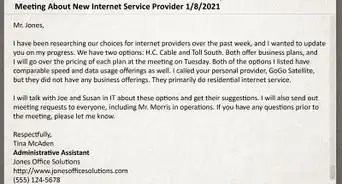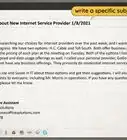This article was co-authored by Devin Jones and by wikiHow staff writer, Eric McClure. Devin Jones is the creator of “The Soul Career," an online career incubator for women. She is certified in the CliftonStrengths assessment and works with women to clarify their purpose and create meaningful careers. Devin received her BA from Stanford University in 2013.
There are 11 references cited in this article, which can be found at the bottom of the page.
This article has been viewed 20,245 times.
It’s never fun to work a job where you don’t feel supported, cared for, and respected, so don’t write this off as something you should simply put up with. A good manager is caring, empathetic, and fun to work for. If this doesn’t describe your boss, there are several ways you can deal with it. Whether you address the problem directly or indirectly depends on your company culture and the rapport you have with your boss, so keep these things in mind when weighing your options and planning out a solution.
Steps
Talking to Your Boss
-
1Ask your boss to chat over coffee, or ask for an informal meeting. If you haven’t addressed the problem directly and you have a reasonably solid relationship with your boss, try tackling the problem head-on. During a quiet time at work, stop by your manager’s office and ask them if they’d like to grab a coffee after work. By keeping the conversation informal, you’ll keep your boss from feeling like you’re attacking them and the meeting won’t feel so rigid.[1]
- You may say something like, “Hey Linda! I was wondering if you had a few minutes after work tomorrow? I have a few things I’d like to talk through; can I take you out for a coffee or something?”
- If your boss declines but suggests sitting down during the workday, that’s totally fine. Just accept their offer, it won’t make a huge difference if the meeting is on the books or not.
- If you don’t have a good rapport with your boss, this may not be a good idea just yet. Try chatting with them by the water cooler and attending after-work social events to build your relationship first.
-
2Frame the conversation around the organization, not your boss’s behavior. Sit down with your boss and start the conversation by focusing on the company’s performance or culture, not their obnoxious negativity. If you come right out and start critiquing them, they’re likely to go on the defensive.[2]
- For example, you may say, “We do a lot of things well, but I feel like we tend to focus on what’s going wrong instead of what’s going right,” or, “How can we do better as a team? What can we improve on?” This way, you frame the conversation around the company, not around any individual’s behavior.
- Stick with “we” while starting the conversation to make your boss feel like you’re in this together. Avoid using the word “you” too often to keep your boss from feeling like the conversation is only about them.
Advertisement -
3Keep things positive and let your manager express themselves. Give your boss the space to speak their mind and answer your question. At no point is it advisable to start accusing or blaming your boss—just let them express themselves and try to see things from their point of view. Stay positive and let your boss rant if they want to rant, or agree if they say things are going well.[3]
- This is where things can go off-script. The aim here is to let your boss talk freely about work until the conversation drifts towards their management style or behavior. If that never happens, don’t force it.
- If your boss actively asks how you think they’re doing, now’s your chance to broach the subject! Say something like, “I think you’ve been great at guiding us as a team, but I think we could use a little morale boost at work.”
- If your boss starts complaining or opening up about how hard things are for them, just let them get it out and don’t critique them.
- If your boss closes off to the conversation or seems like they’re getting annoyed, just let it go. There’s no point in pushing the conversation forward if it isn’t particularly productive.
-
4Think about how to appeal to your boss's unique personality. Sometimes when you're having trouble getting along with someone at work, it's because you're motivated by different things. Try to figure out what makes the other person feel energized and excited. You can then use that knowledge to figure out how to move forward together.[4]
- For instance, if your boss tends to get annoyed during the planning process of a project, you might talk to them about whether they'd prefer you just present them with an action plan once it's ready.
-
5Speak your mind but be polite to address the problem once it comes up. The goal of talking to your boss is to build the relationship and make them sympathetic to you and your team. However, if they give you an opening to give them direct feedback and they seem authentically open to it, take them up on their offer. Address the problem directly and politely.[5]
- If they say something like, “How do you think I’m doing? Am I doing a good job?” or, “What could I do better?” answer them honestly. You may say, “Honestly, there’s a lot I think you do well, but it feels like you’ve been extra hard on us lately,” or, “If I can speak freely, it feels like you only focus on the negative sometimes.”
-
6Use the sandwich method if your boss doesn’t take criticism well. If your boss isn’t particularly good at taking criticism, you may try the sandwich method. This is where you start with something positive, provide the criticism, and then finish with another positive note. This is likely the best way to suggest your boss is being too negative if they tend to snap at people who correct or critique them.[6]
- You may say, “I love the way you lead meetings, but they could be a little more positive and friendly. Also, I think you navigated the challenges with our last client extremely well.”
- For something a little more personal, you might say, “I really enjoy working for you. However, it feels like you’re really hard on me sometimes. I know you just want me to do well, but it’s hard sometimes.”
Keeping Your Boss Happy
-
1Pretend your boss is a difficult client and you’re in charge to manage up. “Managing up” is a strategy for dealing with a boss that may be holding you back. To manage up, you basically pretend that your manager is a really difficult client or customer, and your job is to make them happy.[7] By doing this, you will ultimately make your boss happy, look better as an employee, and empower yourself to feel less stress at work.[8]
- Managing up is more of a philosophy than a strict set of steps. The premise is this: when your boss is awful, you don’t want to be a good employee. But if you don’t make your boss look good, you look bad. If you don’t do what your boss asks, you get criticized. Managing up will keep this from happening.
-
2Identify what is driving your boss to be so negative all the time. Brainstorm and ask yourself, “What does my boss really care about?” It may be that your boss wants the team to perform better, or they may simply want to look good for the board of directors. Maybe they’re lazy and they really just want to do as little work as possible. Once you know what your boss cares about, you can start managing up![9]
- If you can’t really tell what your boss cares about, ask yourself this question: “When my boss gets angry or negative, what do they complain about?” This should give you the best insight into what your boss cares about.
-
3Anticipate what your boss is going to complain about and fix it now. If your boss sends an email out about keeping the office organized, clean up your desk now and take a few minutes to rearrange the break room. If your boss freaks out whenever you don’t file a report on time, fill out those files on your desk. Once you know what your boss gets upset about, you can focus your energy on keeping them from reaching that point where they can correct you.[10]
- Unless they’re really out of bounds, the odds are high that your boss isn’t being negative for no reason. By fixing the problem before your manager has a chance to respond to it, you reduce the odds that they’re going to be negative in the first place.
- The other upside here is that your boss is going to realize that you make their life easier by removing things that frustrate them. This is going to make you look like a productive and responsible worker!
-
4Solve problems for your boss before they even know they exist. It may feel weird going out of your way to fix problems for your boss when they’re so miserable to work with, but it’s important to do everything in your power to make things easy for them. By handling calls, making sales, or tackling problems without their intervention, you create enough space for you to handle problems your way, not their way. It also increases the odds that your boss notices and gives you more breathing room at work.[11]
- Think of it this way: are you going to be happier if your boss is less negative? If the answer is yes, then being the most efficient employee you can be is in your best interest!
-
5Disagree respectfully when it’s appropriate and keep your anger in check. Managing up does not mean you’re sucking up—tell your boss when you think they’re making a mistake. Just be sure that you’re respectful and polite when you disagree with them and never take things personally if they snap at you for disagreeing.[12]
- Remember, you’re treating your boss like a difficult client or customer. You would advise or disagree with a client if you think they’re making a mistake, but you’d never yell at them or get angry about it.
- Negative bosses tend to handle disagreements like personal attacks. Word your disagreements carefully. For example, don’t say, “I think you’re wrong,” say, “We could go in that direction, but if we do it this other way?”
-
6Do your best to help your boss succeed and focus on the long-term goal. Whenever you have an opportunity to make your boss look good, take it. The more you can accomplish at your job and the better your boss looks, the more likely you are to succeed and stand out as a candidate for future promotions. Your long-term goal here is to be happy at work and deal with your terrible boss. In an odd way, making them look good helps you accomplish both goals.[13]
- Again, the philosophy of “managing up” is just one option. If you find it personally and professionally difficult to work this way, that’s okay. There’s nothing wrong with not going out of your way to help a terrible or uninspiring manager.
Coping Personally and Professionally
-
1Treat your experience like a learning opportunity on what not to do. If you aren’t going to stay at this company forever, just treat it as a primer on how you shouldn’t manage in the future. Instead of internalizing negative remarks, just study how it makes you feel and observe how it makes your coworkers behave. By learning what not to do from a negative boss, this experience can make you a more effective leader in the future.[14]
- It may not feel all that great to go into work now, but try to remind yourself that you’re gaining valuable (albeit painful) experience here.
-
2Stay out of your boss’s way and don’t take any criticism personally. If your boss snaps at you or critiques you unfairly, don’t take it to heart. You are not a bad person and you certainly aren’t a bad employee. Your boss’s behavior says more about them than it does about you. If you feel singled out, try to stay out of their way and just focus on your work.[15]
- To stay out of the way, you may schedule team meetings when you know your boss is busy, take your lunch break at a different time than them, or show up a little early to avoid them on your way into the office.
- Keeping your head down doesn’t mean you don’t do your job. Just avoid your boss and do what you need to do.
-
3Tell your boss what they want to hear if it isn’t a big deal. If your boss is being negative or complaining about something and it isn’t particularly important, just placate them. This will shut the conversation down, make your boss happy, and let you get back to things that actually matter. This avoids the underlying problem, but at least you won’t have to deal with a negative manager when it doesn’t count for much.[16]
- For example, if your boss keeps saying, “I don’t get why you’re always on the phone,” but you’ve been taking client calls all day, just say, “You’re right, I’ll try to keep those client calls shorter” and move on. If you don’t give them the opportunity to stay negative, they’ll have nothing left to say.
-
4Let your boss hang themselves out to dry over time and wait. In the back of your mind, just remember that a terrible boss is rarely the boss for long. The more negative your boss gets, the less likely employees are to do well. This means they aren’t going to look very good to the owners or higher-ups. Your boss will eventually be replaced, fired, or quit. It may not happen today, and it may not happen next week, but it will happen eventually.[17]
- Your boss may be exceptionally negative because they’re underperforming. If this is the case, they’re definitely not going to be around much longer.
- If your boss seems like they’re becoming increasingly more negative, they may be frustrated with the organization or have something going on at home. If it’s the former, they may quit soon. If it’s the latter, they may ease up after they address the problem in their personal life.
-
5Spend more time doing things you enjoy in your off time. If you’re taking work home with you or you’ve stopped doing things you enjoy after work because you’re feeling down, you aren’t helping anything. Leave your work at the office and spend your time off doing things you really love. Don’t think about work and find something to look forward to when you clock out. This will keep you from getting down in the dumps about how things are going at work.[18]
- If you love movies, pick 1-2 days a week to catch up on films you’ve been meaning to see. If you enjoy playing sports, join a recreational league and get back on the court or field. If you’re a foodie, pick a few new restaurants to visit every week with your friends or partner.
- There’s never a bad time to pick up a new hobby! You could get a new video game system, join a bowling league, start working out, or begin collecting something interesting.
Taking a Stand
-
1Speak up to stop abusive behavior if your boss crosses a line. Your boss may be abusing you if they’re ridiculing you, calling you names, invading your privacy, or isolating you from your coworkers. Either confront your boss privately, talk to your HR rep, or file a formal complaint. In any case, you should never tolerate abuse. Everyone deserves to be shown respect and while it isn’t your fault that your boss is abusive, you should take steps to stop this behavior in its tracks.[19]
- There’s a difference between an obnoxiously negative boss and a manager that’s abusive. Negativity can be dealt with, but abuse needs to be addressed.
- The other thing you want to look out for is anything illegal. If your boss is actively breaking a law, it’s time to report them to the police or their boss, depending on the nature of the crime. If they’re lying on financial reports, that’s talk-to-the-boss’s-boss territory. If they’ve injured someone or physically assaulted you, it’s time to call the authorities.
-
2Report your manager to HR to let them address the problem. If your boss just simply won’t let up after you’ve tried to address the situation, talk to human resources. You may also want to go this route if you’re uncomfortable about confronting them directly. HR’s job is to handle things like this, and they may be able to resolve the problem for you.[20]
- At worst, they’ll document the complaint and give you some evidence in the future if your boss tries to punish you for standing up for yourself.
- If you aren’t sure what to do, you can always as to sit down with an HR rep and discuss the problem abstractly to get some guidance. You may say, “Theoretically speaking, what should I do if a coworker is being aggressive and rude?” Keep your boss’s name out of it and don’t mention they’re in management to get an unbiased bit of direction.
-
3Enlist help from your coworkers to take a major stand as a group. If the negativity is widespread at work and you know your coworkers aren’t happy either, hold a team meeting. Talk together and come up with a plan to politely address your boss’s behavior as a group. By presenting a unified front, your boss may realize that they seriously have a problem.[21]
- You could write a letter explaining your grievances and have each coworker sign it.
- You may meet with your boss as a group and try to have a productive conversation about the issue.
- You could all meet with HR as a group and air your concerns together, which will corroborate and reinforce the claims that you’re making about your boss.
- Be careful when bringing this up to your coworkers. If they aren’t on the same page, they may report you to the boss, which could get ugly. Test the waters if you aren’t sure. Ask them, “How do you all feel about how things are going at work?” and see what they say.
-
4Look for a new job if you aren’t happy and can’t improve things. If you’re actively unhappy and things aren’t improving at work, consider looking for a new job. Life is too short to spend it doing something that you hate and there’s no shame in calling it quits if your workplace isn’t healthy.[22] Update your resume and spend a few hours every weekend browsing job boards and applying to new positions.
- If you work at a larger company, you can always apply for a different position at another branch or in a different department.
- There’s actually some substantial research that most people don’t leave their job, they leave their manager.[23] Don’t be hard on yourself if you call it quits in a role because your boss is a jerk—a lot of people leave for this reason. There’s nothing wrong with finding a new job if you’re going to be happier, healthier, and more productive at a new company.
Expert Q&A
-
QuestionHow can I work with someone I usually clash with?
 Devin JonesDevin Jones is the creator of “The Soul Career," an online career incubator for women. She is certified in the CliftonStrengths assessment and works with women to clarify their purpose and create meaningful careers. Devin received her BA from Stanford University in 2013.
Devin JonesDevin Jones is the creator of “The Soul Career," an online career incubator for women. She is certified in the CliftonStrengths assessment and works with women to clarify their purpose and create meaningful careers. Devin received her BA from Stanford University in 2013.
Career Coach Try to keep in mind that people operate differently and are motivated by things differently from you. What may be energizing and exciting for you could be draining for another person. You have to be able to have open conversations so you can move through those frustrating experiences.
Try to keep in mind that people operate differently and are motivated by things differently from you. What may be energizing and exciting for you could be draining for another person. You have to be able to have open conversations so you can move through those frustrating experiences.
References
- ↑ https://hbr.org/2014/05/managing-a-negative-out-of-touch-boss
- ↑ https://hbr.org/2014/05/managing-a-negative-out-of-touch-boss
- ↑ https://hbr.org/2014/05/managing-a-negative-out-of-touch-boss
- ↑ Devin Jones. Career Coach. Expert Interview. 5 April 2019.
- ↑ https://www.forbes.com/sites/margiewarrell/2014/01/20/6-strategies-to-hanhandldling-a-bad-boss/#66f9201e6ea0
- ↑ https://aabri.com/manuscripts/141831.pdf
- ↑ https://www.forbes.com/sites/margiewarrell/2014/01/20/6-strategies-to-hanhandldling-a-bad-boss/#66f9201e6ea0
- ↑ https://www.forbes.com/sites/rodgerdeanduncan/2018/05/26/why-managing-up-is-a-skillset-you-need/#5f9c263237fd
- ↑ https://www.forbes.com/sites/margiewarrell/2014/01/20/6-strategies-to-hanhandldling-a-bad-boss/#66f9201e6ea0
- ↑ https://hbr.org/2015/01/what-everyone-should-know-about-managing-up
- ↑ https://hbr.org/2015/01/what-everyone-should-know-about-managing-up
- ↑ https://time.com/3714935/boss-disagree/
- ↑ https://www.forbes.com/sites/rodgerdeanduncan/2018/05/26/why-managing-up-is-a-skillset-you-need/#5f9c263237fd
- ↑ https://hbr.org/2019/01/does-having-a-bad-boss-make-you-more-likely-to-be-one-yourself
- ↑ https://www.knowablemagazine.org/article/society/2018/bad-bosses-dealing-abusive-supervisors
- ↑ https://medium.com/better-humans/how-to-handle-a-toxic-manager-e629f2256139
- ↑ https://hbr.org/2014/05/managing-a-negative-out-of-touch-boss
- ↑ https://hbr.org/2014/05/managing-a-negative-out-of-touch-boss
- ↑ https://www.knowablemagazine.org/article/society/2018/bad-bosses-dealing-abusive-supervisors
- ↑ https://www.cbsnews.com/news/when-your-hr-department-is-your-friend/
- ↑ https://www.knowablemagazine.org/article/society/2018/bad-bosses-dealing-abusive-supervisors
- ↑ https://hbr.org/2014/05/managing-a-negative-out-of-touch-boss
- ↑ https://www.forbes.com/sites/margiewarrell/2014/01/20/6-strategies-to-hanhandldling-a-bad-boss/#66f9201e6ea0

















































































